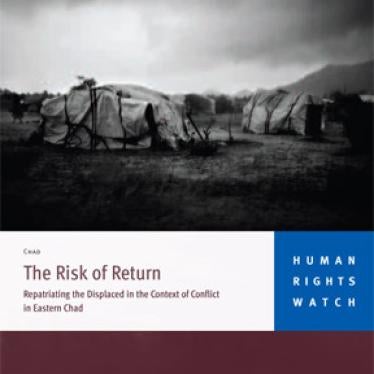(New York) - The United Nations Security Council should extend the mandate of the United Nations Mission in the Central African Republic and Chad (MINURCAT) when it comes up for renewal in March 2010, Human Rights Watch said in a letter to Security Council members today. Withdrawing the peacekeepers would expose civilians to increased violence and human rights abuses, Human Rights Watch said.
In January, the government of Chad asked the mission to leave at the end of its current mandate, on March 15, stating that its security forces could provide security for displaced populations and refugees in eastern Chad. However, Chadian forces have failed to provide security in the past, and the situation is still volatile.
"The UN peacekeepers are helping to protect civilians and to press the government to punish abuses," said Georgette Gagnon, Africa director at Human Rights Watch. "This work needs to continue given the persistent threats to civilians in eastern Chad."
Peacekeepers have been in Chad and northeastern Central African Republic since mid-2008 with a mandate to protect refugees and displaced populations, facilitate humanitarian assistance, and promote human rights. In January 2009, the council extended their mandate, replacing European Union forces with 5,200 UN troops.
As Human Rights Watch has reported, civilians - including refugees from Darfur in eastern Chad - face violence and other human rights abuses by Chadian soldiers, rebel forces, and armed criminal gangs, and these factors have prevented the large-scale return of displaced populations. The historically volatile relations between Chad and neighboring Sudan, national elections in Sudan scheduled for April, and national parliamentary elections scheduled for November in Chad, could also destabilize the region, Human Rights Watch said.
"This is the wrong time to leave," Gagnon said. "If the peacekeepers leave now, at this critical and potentially volatile time, they could expose civilians to more danger and human rights abuses."
Withdrawal of the peacekeepers would have a negative impact on humanitarian agencies that rely on them for escorts and to provide security, Human Rights Watch said. An early withdrawal could also undermine the peacekeepers' human rights work and cut short their assistance to justice efforts in eastern Chad, including the Chadian Detachement Integre de Securite, which provides security in and around camps for displaced persons and refugees. The peacekeepers also support other justice institutions to improve their capacity to uphold human rights.
"The UN is supporting critical programs that help end impunity and build capacity for justice institutions in Chad," Gagnon said, "These efforts should be given a chance to work, and this means allowing both military and civilian components of the peacekeeping mission to stay longer."
UN Resolution 1861 adopted benchmarks outlined by Secretary-General Ban Ki-moon in his December 2008 report on MINURCAT. These include the secure return of displaced populations, a reduction in human rights violations in camps for displaced persons and refugees, and increasing the capacity of Chadian security forces and rule-of-law institutions. Human Rights Watch urged the UN and Chad to link any drawdown of the mission to progress on these benchmarks.
"The UN needs to work with the Chadian government to meet these benchmarks," said Gagnon. "They still have a long way to go."







